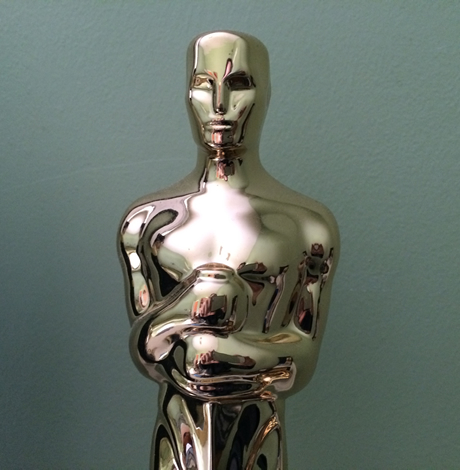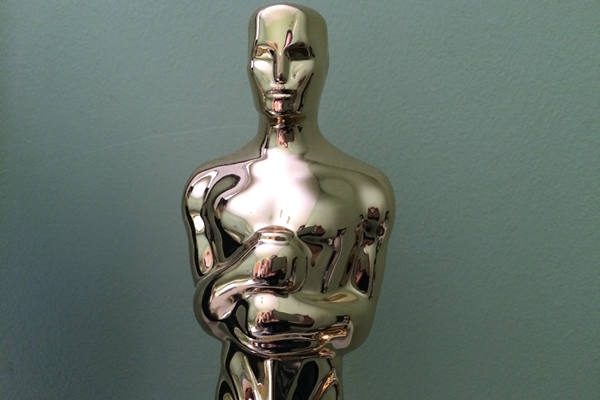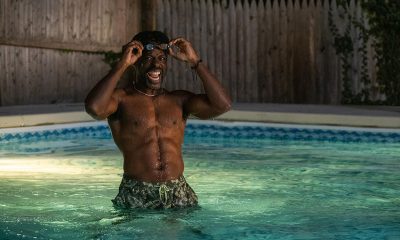Arts & Entertainment
Oscar announcement brings LGBT surprises
Nominations abound but will any of them take home the gold?

By JOHN PAUL KING
The Oscar nominations for 2017 have been announced, and while there are, as usual, a few surprises as to who has been included and who has been left out, most savvy film aficionados will find the list of competitors a close match to their expectations.
It’s been an unusually rich year for “award bait” movies. In many (if not most) past Oscar races, there have been one or two clearly worthy front-runners and the rest of the crop has seemed like filler.
Even so, the Oscars have never been about quality alone; politics have always played a part in determining nominations and especially winners. In this year’s contest, not surprisingly in a cultural context rife with polarizing controversy, that observation may be truer than ever.
Categories that are traditionally all-male include women. Greta Gerwig received a nod for her direction of “Lady Bird” and “Mudbound” garnered a nomination for its cinematographer, Rachel Morrison, the first female to be so-recognized.
Black talent has also been acknowledged. Jordan Peele earned well-deserved (and pleasantly surprising) nominations for both directing and writing his brilliant blend of horror and social satire “Get Out,” which was also included as a Best Picture contender. That movie’s star, Daniel Kaluuya, is also a nominee for Best Actor as is Denzel Washington, for his work in “Roman J. Israel, Esq.,” a rare instance of two black performers included in the running for that prize.
The most obvious area of improvement this time out, however, is the amount of recognition the Academy has given to LGBT-themed movies and performances.
Most prominent, of course, is “Call Me By Your Name.” This gay coming-of-age story may have generated some controversy over the age gap between its two protagonists (especially after the revelations about Kevin Spacey’s long history of age-inappropriate sexual advances), but it overcame such concerns to become one of the best received and most recognized films of the year. Its nomination for Best Picture is no surprise, nor is its presence in the categories of Best Actor and Best Adapted Screenplay, though its nod for Sufjan Stevens’ “Mystery of Love” in the Best Original Song category may have raised some eyebrows.
What’s disappointing and telling is the exclusion of co-star Armie Hammer (considered as a likely bet for a Best Supporting Actor bid) and, even more shocking, Luca Guadagnino for the Best Director prize. The latter snub seems particularly pointed, considering that Guadagnino is one of the film’s few openly gay contributors, underscoring the not-unfair criticism that, though “Call Me” is an LGBT-themed movie, its participants (including both lead actors) are straight.
On the other hand, James Ivory, who is also an out gay man, was nominated for his adaptation of André Aciman’s book; no stranger to Oscar attention (“A Room With A View,” “The Remains of the Day” and “Howard’s End”), he is considered a front-runner to take home the statuette.
Unfortunately for fans of Timothée Chalamet, his chances of a win are far less likely. Though he grabbed some trophies early in this year’s awards season, he has since been eclipsed by Gary Oldman’s powerhouse turn as Winston Churchill in “The Darkest Hour,” which has dominated the Best Actor category at most of the recent ceremonies. Oldman is a well-loved performer who has been passed over several times for past work; on top of that, “Darkest Hour” proved its popularity among industry insiders by making a surprising show in the Oscar list, even grabbing an unexpected slot in the Best Picture roster. Both of those factors make it impossible to doubt that Chalamet, despite giving us one of the most unforgettable film performances in recent memory, will be going home empty-handed.
There are other LGBT-relevant films singled out in this year’s nominations.
Though not explicitly gay-themed, Gerwig’s “Lady Bird” does feature a tenderly handled subplot involving a gay character. That film is well-represented in the competition, and stands a reasonable chance of winning any of its nods for Best Picture, Director, Original Screenplay, Actress (Saorise Ronen) or Supporting Actress (Laurie Metcalf).
Likewise, Guillermo Del Toro’s “The Shape of Water,” which leads the nomination tally with a total of 13, is not an LGBT movie but an exploration of “otherness” in a world dominated by straight, white, cis-gendered male identity. It also prominently features a gay character, an older commercial artist whose happiness is blocked at every turn by homophobia and the psychology of the closet, played by actor Richard Jenkins.
For his likable performance, he has been nominated for Best Supporting Actor; like Chalamet, though, his chances are overshadowed by a powerhouse front-runner — Sam Rockwell, whose work as an evolving racist cop in “Three Billboards Outside Ebbing, Missouri” is considered the clear favorite for the win.
Finally, in the category of Best Foreign Language Film, the Chilean/German co-production, “A Fantastic Woman,” secured a nomination. The story of a transgender woman fighting transphobia for the right to mourn after the death of her lover, it should also have gotten recognition for its star, trans actress Daniela Vega, who gave one of the strongest performances of the year, by any standard. As a foreign performer, and a relatively inexperienced and unknown one, she didn’t stand much of a chance. But the Academy missed a chance to show support and solidarity with the trans community by giving her a nod. Even so, the film’s nomination is a major step, although the omission of “BPM (Beats per Minute)” within the same category, is a disappointment.
It’s too early in the race to make predictions. Though “Three Billboards” is currently considered the favorite to win (along with its star Frances McDormand and the previously mentioned Rockwell), controversy over its handling of racist themes (as well as some critical backlash over the contrivances of its story) may lower its chances as the big night draws nearer and “Shape of Water” made such a strong showing in the nominations that its popularity among Academy voters is impossible to ignore.
Even given such causes for doubt, however, it seems certain that Oscar will not be duplicating the triumphant validation it delivered for queer awareness with its selection of “Moonlight” for Best Picture.
This year, it looks like the LGBT community will be an also-ran.

Team DC, the umbrella organization for LGBTQ-friendly sports teams and leagues in the D.C. area, held its annual Night of Champions Awards Gala on Saturday, April 20 at the Hilton National Mall. The organization gave out scholarships to area LGBTQ student athletes as well as awards to the Different Drummers, Kelly Laczko of Duplex Diner, Stacy Smith of the Edmund Burke School, Bryan Frank of Triout, JC Adams of DCG Basketball and the DC Gay Flag Football League.
(Washington Blade photos by Michael Key)




















The 2024 National Cannabis Festival was held at the Fields at RFK Stadium on April 19-20.
(Washington Blade photos by Michael Key)
















Covering the @NatlCannaFest at RFK Stadium for @WashBlade . Stop by the LGBTQ+ booth and pick up a paper if you are here. pic.twitter.com/is7hnsaPns
— Michael Patrick Key (@MichaelKeyWB) April 20, 2024
Theater
‘Amm(i)gone’ explores family, queerness, and faith
A ‘fully autobiographical’ work from out artist Adil Mansoor

‘Amm(i)gone’
Thorough May 12
Woolly Mammoth Theatre
641 D St., N.W.
$60-$70
Woollymammoth.net
“Fully and utterly autobiographical.” That’s how Adil Mansoor describes “Amm(i)gone,” his one-man work currently playing at Woolly Mammoth Theatre.
Both created and performed by out artist Mansoor, it’s his story about inviting his Pakistani mother to translate Sophocles’s Greek tragedy “Antigone” into Urdu. Throughout the journey, there’s an exploration of family, queerness, and faith,as well as references to teachings from the Quran, and audio conversations with his Muslim mother.
Mansoor, 38, grew up in the suburbs of Chicago and is now based in Pittsburgh where he’s a busy theater maker. He’s also the founding member of Pittsburgh’s Hatch Arts Collective and the former artistic director of Dreams of Hope, an LGBTQ youth arts organization.
WASHINGTON BLADE: What spurred you to create “Amm(i)gone”?
ADIL MANSOOR: I was reading a translation of “Antigone” a few years back and found myself emotionally overwhelmed. A Theban princess buries her brother knowing it will cost her, her own life. It’s about a person for whom all aspirations are in the afterlife. And what does that do to the living when all of your hopes and dreams have to be reserved for the afterlife?
I found grant funding to pay my mom to do the translation. I wanted to engage in learning. I wanted to share theater but especially this ancient tragedy. My mother appreciated the characters were struggling between loving one another and their beliefs.
BLADE: Are you more director than actor?
MANSOOR: I’m primarily a director with an MFA in directing from Carnegie Mellon. I wrote, directed, and performed in this show, and had been working on it for four years. I’ve done different versions including Zoom. Woolly’s is a new production with the same team who’ve been involved since the beginning.
I love solo performance. I’ve produced and now teach solo performance and believe in its power. And I definitely lean toward “performance” and I haven’t “acted” since I was in college. I feel good on stage. I was a tour guide and do a lot of public speaking. I enjoy the attention.
BLADE: Describe your mom.
MANSOOR: My mom is a wonderfully devout Muslim, single mother, social worker who discovered my queerness on Google. And she prays for me.
She and I are similar, the way we look at things, the way we laugh. But different too. And those are among the questions I ask in this show. Our relationship is both beautiful and complicated.
BLADE: So, you weren’t exactly hiding your sexuality?
MANSOOR: In my mid-20s, I took time to talk with friends about our being queer with relation to our careers. My sexuality is essential to the work. As the artistic director at Dreams of Hope, part of the work was to model what it means to be public. If I’m in a room with queer and trans teenagers, part of what I’m doing is modeling queer adulthood. The way they see me in the world is part of what I’m putting out there. And I want that to be expansive and full.
So much of my work involves fundraising and being a face in schools. Being out is about making safe space for queer young folks.
BLADE: Have you encountered much Islamophobia?
MANSOOR: When 9/11 happened, I was a sophomore in high school, so yes. I faced a lot then and now. I’ve been egged on the street in the last four months. I see it in the classroom. It shows up in all sorts of ways.
BLADE: What prompted you to lead your creative life in Pittsburgh?
MANSOOR: I’ve been here for 14 years. I breathe with ease in Pittsburgh. The hills and the valleys and the rust of the city do something to me. It’s beautiful, it’ affordable, and there is support for local artists. There’s a lot of opportunity.
Still, the plan was to move to New York in September of 2020 but that was cancelled. Then the pandemic showed me that I could live in Pittsburgh and still have a nationally viable career.
BLADE: What are you trying to achieve with “Amm(i)gone”?
MANSOOR: What I’m sharing in the show is so very specific but I hear people from other backgrounds say I totally see my mom in that. My partner is Catholic and we share so much in relation to this.
I hope the work is embracing the fullness of queerness and how means so many things. And I hope the show makes audiences want to call their parents or squeeze their partners.
-

 South America4 days ago
South America4 days agoDaniel Zamudio murderer’s parole request denied
-

 Maryland5 days ago
Maryland5 days agoMontgomery County police chief discusses arrest of trans student charged with planned school shooting
-

 Commentary5 days ago
Commentary5 days agoWorld ‘isn’t much different today’
-

 State Department20 hours ago
State Department20 hours agoState Department releases annual human rights report










